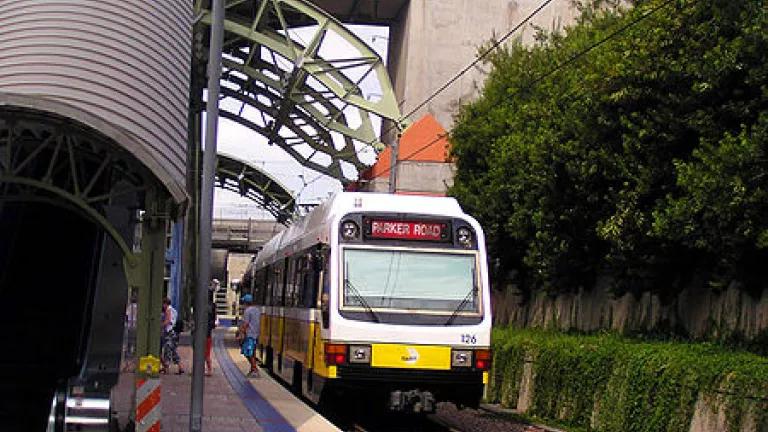
In another of a series of reminders that this is an election year, Republican Budget Chairman Paul Ryan rolled out his bid for the fiscal year 2013 federal budget. Much of this is kabuki theater, as Taxpayers for Common Sense points out.
Even taking it with a grain of salt, though, it’s an alarming proposal for transportation’s future. It would take the program over a cliff, slashing it by about half in 2013 with annual cuts to the current level for ten years afterwards. Over the next six years it comes in a quarter lower than the Administration’s proposal (pdf here), as Ben Goldman of streetsblog says (Ben also points out that this would put us behind peer nations in infrastructure investment as a percentage of GDP).
The House Democratic alternative mirrors the Administration’s, with an initial boost in investment and the establishment of an infrastructure bank to leverage private dollars, an approach that’s worked well in other nations as I’ve written about here.
Ryan’s budget, by contrast, attacks some of the most worthwhile existing transportation programs, proposing that sidewalks and trails benefiting those of us who walk or bike aren’t worth supporting. And a much bigger set of investments that have helped launch wildly successful public transportation initiatives in cities such as Charlotte, Dallas and Salt Lake City is cavalierly dismissed:
Terminate and reform spending on ineffective, wasteful subsidies and underperforming programs. The budget includes reductions for terminating the New Starts and Small Starts programs within the Department of Transportation. The benefits of these mass transit projects are local, not national.
Metropolitan regions working to improve mobility and deliver transportation choices to businesses and residents would beg to differ. These projects help those regions to compete economically, and when our metro regions are competitive by definition America is competitive, since they account for the majority of our GDP and as Brookings tracks they are in various stages of economic recovery. And this is not to mention the supply chain benefits of investments in rail cars and buses, which as Treasury Secretary Tim Geithner says ripple across the an economy that is tied together by transportation.
Photo by Drumguy8800
The most recent assessment of the conditions and performance of our transportation system shows that we must invest about $100 billion a year just to keep up with repairs and maintenance of federally assisted highways and transit projects. And presumably we want the system to grow, to underpin more economic development.
The Ryan budget is, in short, highly irresponsible especially given the precarious state of the economy.
It does, however, underline a big shortcoming of the transportation debate generally. The federal gas tax, a user fee for those of us who use the transportation system (there’s no such thing as a free lunch), hasn’t increased in almost 20 years. Consequently maintaining transportation investment levels requires transfers from a general fund which is running chronic deficits. So the transportation program contributes to our debt and deficit every year.
There are at least three long-term solutions to this problem. One, we keep borrowing. I don’t know many people who favor that considering how much owe already. Two, we dramatically cut the program back, which is what Ryan suggests, although there are various ways to do this including a uniform haircut or disproportionate slashing as he does with an oversubscribed and useful transit program. Or three, we agree to what President Reagan termed “revenue enhancements,” a euphemism for increasing the gas tax or developing some other revenue source for valuable investments.
This is what Senator Enzi has been pressing for via an indexation of the gas tax to inflation (this wouldn’t address current revenue shortfalls but over time it would help the trust fund keep up with needs). It is what former Treasury Secretary Larry Summers suggests in a Financial Times column this week, although he cleverly proposes it as a “contingent commitment” that would boost infrastructure investment and create a trigger for a gas tax increase only when “some level of employment or output growth has been achieved for a given interval.”
Regardless of the form it takes, it is worthy of debate. While this is exceedingly unlikely in an election year, policymakers must face facts sooner rather than later if we are serious about remaining economically competitive.
